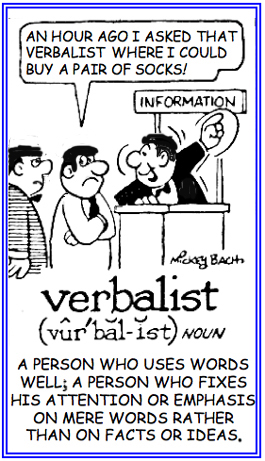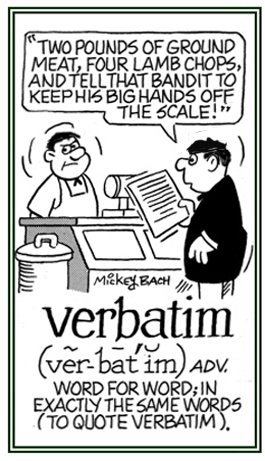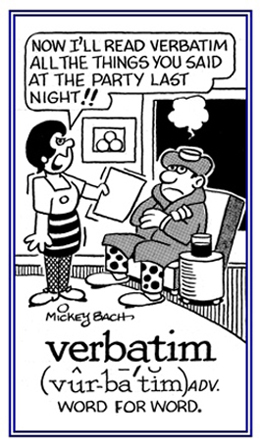verbo-, verb-, verbi-
(Latin: word, words)
verbalism
1. A verbal expression; a word or vocable.
2. Predominance of what is merely verbal over reality or real significance.
3. The uncritical or undisciplined use of words, especially without any attempt to analyze their meanings or values.
2. Predominance of what is merely verbal over reality or real significance.
3. The uncritical or undisciplined use of words, especially without any attempt to analyze their meanings or values.
1. Someone who is experienced and skilled in the use of words, often at the expense of good ideas and reality: James loved to go to dinner parties where he could show off his expertise as a verbalist, and it didn’t matter to him if he had anything worthwhile to say!
2. A person who pays too much attention to mere words rather than concentrate on facts, feelings, and ideas: Becky just ignored the significant topics at hand and talked about nothing, and, as a terrific verbalist, used wonderful and impressive expressions!
3. Etymology: from Latin verbum, "words."

© ALL rights are reserved.
Go to this Word A Day Revisited Index
2. A person who pays too much attention to mere words rather than concentrate on facts, feelings, and ideas: Becky just ignored the significant topics at hand and talked about nothing, and, as a terrific verbalist, used wonderful and impressive expressions!
3. Etymology: from Latin verbum, "words."

Go to this Word A Day Revisited Index
so you can see more of Mickey Bach's cartoons.
verbalistic
Of, pertaining to, or characterized by verbalism.
verbality
1. The quality of being (merely) verbal; that which consists of mere words or verbiage.
2. Verbal expressions or phrases.
3. The quality appropriate to a verb.
2. Verbal expressions or phrases.
3. The quality appropriate to a verb.
verbalizable (adjective) (not comparable)
Capable of being expressed in words, particularly out loud; able to be articulated: The group of mourners had feelings that were verbalizable, but they didn't want to communicate them while the reporter was present.
verbalization
1. The action of verbalizing or the fact of being verbalized.
2. A verbal expression or statement.
3. In psychiatry, the state of being verbose or diffuse, commonly encountered in an extreme degree in patients with the manic form of manic-depressive psychosis.
2. A verbal expression or statement.
3. In psychiatry, the state of being verbose or diffuse, commonly encountered in an extreme degree in patients with the manic form of manic-depressive psychosis.
In a more general sense, verbalization refers to the expression in words of thoughts, wishes, phantasies, or other psychic material that had previously been on a nonverbal level because of suppression or repression. “Verbalize” is often used in a pseudoerudite way when “talk about” is meant.
verbalize (verb), verbalizes; verbalized; verbalizing
1. To express something in words: Instead of holding back his question to the teacher, he verbalized it using a loud voice.
2. To use many words; to talk diffusely; to be verbose: Ned wanted to appear intelligent and verbalized on the paintings in the museum without knowing much about art himself.
3. To make a word, as a noun or adjective, into a verb: Mrs. Smart asked the students to verbalize the term "teacher" and one student answered with, "To teach!"
2. To use many words; to talk diffusely; to be verbose: Ned wanted to appear intelligent and verbalized on the paintings in the museum without knowing much about art himself.
3. To make a word, as a noun or adjective, into a verb: Mrs. Smart asked the students to verbalize the term "teacher" and one student answered with, "To teach!"
verbalizer
One who registers stimuli or thoughts mentally in verbal terms rather than in visual images; one who verbalizes.
verbally
1. Word for word; in respect of each word.
2. In or with (mere) words, without accompanying action or reality.
3. So far as words (only) are concerned.
4. In actual words; by means of words or speech.
5. In speech, as contrasted with writing.
6. With the function of a verb.
2. In or with (mere) words, without accompanying action or reality.
3. So far as words (only) are concerned.
4. In actual words; by means of words or speech.
5. In speech, as contrasted with writing.
6. With the function of a verb.
verbarian
1. Having to do with words.
2. An inventor or coiner of words.
2. An inventor or coiner of words.
verbarium (s) (noun); verbariums, verbaria
1. A game in which letters are formed into words; also, one in which a word is changed into others by re-arrangement of its letters: "The daily newspaper frequently published verbaria to challenge the word skills of its readers."
2. A dispute or dialogue which may be verbal or written, typically involving issues regarding words and word usage: "The two editors of the latest dictionary engaged in a good humored verbarium over the definitions of some words and phrases."
2. A dispute or dialogue which may be verbal or written, typically involving issues regarding words and word usage: "The two editors of the latest dictionary engaged in a good humored verbarium over the definitions of some words and phrases."
verbate
To reproduce word for word.
verbatim (adverb) (not comparable)
1. Referring to how something is repeated word-for-word, literally, either written or spoken: In court, Janet repeated verbatim what the culprit told her on the street.
2. Etymology: from Latin verbum, "word."

© ALL rights are reserved.

© ALL rights are reserved.
Go to this Word A Day Revisited Index
2. Etymology: from Latin verbum, "word."


Go to this Word A Day Revisited Index
so you can see more of Mickey Bach's cartoons.
verbatim et litteratim
Word for word and letter for letter; accurately rendered. Sometimes this phrase is written as: verbatim et litteratim et punctatim; or as, "Word for word and letter for letter and point for point."
Verbera, sed audi. (Latin saying)
Literally, "Beat me, but hear me out." Freely translated as, "Don't shoot the messenger."


